February 2, 2018
Edited by David Sanders
Specimen Days
1849—Pavol Országh Hviezdoslav, Slovak poet (d. 1921), is born.
1882—James Joyce, Irish novelist and poet (Dubliners, Ulysses, Finnigan's Wake), born in Dublin, Ireland (d. 1941).
1882—James Stephens, Irish poet (Crock of Gold), is born.
1907—Bernardas Brazdzionis, Lithuania, poet/editor/critic, is born.
1916—Xuân Diệu, Vietnamese poet (d. 1985), is born.
1923—James Dickey, poet and actor (Deliverance), born in Atlanta, Georgia, is born.
1926—Nydia M E Ecury, Arubian poet/actress (Kantika pa Mama Tera), is born.
1942—Daniil Kharms [Yuvatchov], Russian surrealist and absurdist writer, poet, and playwright, dies of starvation during the siege of Leningrad at 36.
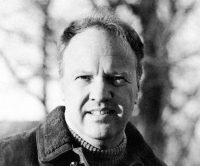
The wind changes round, and I stir
Within another’s life. Whose life?
Who is dead? Whose presence is living?
When may I fall strangely to earth,
Who am nailed to this branch by a spirit?
Can two bodies make up a third?
To sing, must I feel the world’s light?
My green, graceful bones fill the air
With sleeping birds. Alone, alone
And with them I move gently.
I move at the heart of the world.
—from “In the Tree House at Night” by James Dickey
“Can two bodies make up a third? / To sing, must I feel the world’s light?” – James Dickey
World Poetry
Nicanor Parra, Chilean Voice in an ‘Anti-Poet’ Movement, Dies at 103
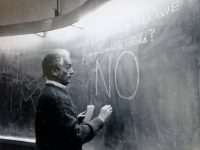
Nicanor Parra, a Chilean poet whose use of direct, colloquial and playful language, often for ironic and comic effect, pioneered the literary movement that became known as anti-poetry, died on Tuesday in Santiago, Chile. He was 103. The death was announced by President Michelle Bachelet, who called Mr. Parra “a singular voice in Western culture.”
The Nicaraguan Poet Sofía Claribel Alegría Dies
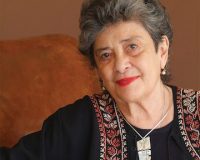
The Nicaraguan poet Claribel Alegría has died this Thursday at 8.30 local time (14:30 GMT), as confirmed EFE sources close to family of writer. Claribel Alegría, aged 93 years, was awarded Reina Sofía Prize for Ibero-American Poetry last year.
Calls to Ban Israeli Poet after Poem Compares Ahed Tamimi to Anne Frank
Israeli Minister of army, Avigdor Liebermann has instructed the state-run radio service Army Radio to halt any future broadcasts of Israeli poet and songwriter Yehonatan Geffen, calling the poet’s work ‘sickening and outrageous’. On Monday night, Geffen released a short poem to his Instagram account in which he compared imprisoned Palestinian teenager Ahed Tamimi to famed Holocaust victim Anne Frank, David of the Biblical David and Goliath, and historic war hero and Catholic Saint, Joan of Arc.
Berlin University Outrages Poet by Erasing his 'Sexist' Lyrics from Wall

The Alice Salomon University in Berlin has decided to paint over a supposedly sexist poem that is currently emblazoned on its façade. In doing so it has been accused of “trampling” on artistic freedom. On Tuesday, the university’s executive committee decided by a majority vote to paint lyrics from a new poetry prize winner every five years instead of keeping the lyrics of the Swiss poet Eugen Gomringer. Students at the university had complained that Gominger's Spanish poem "avenidas" was discriminatory against women since it uses the phrase "avenues and flowers and women and an admirer". Students claimed that the line portrayed women as mere objects of male admiration.
The Nicaraguan poet Claribel Alegría has died at the age of 93.
Recent Reviews
On Walking On by Cole Swensen
by Karen An-hwei Lee
Writerly relationships to walking, whether through philosophical histories of wanderlust or souls of environmental conscience, yield fascinating insights into the pedestrian lives of other scribes. A splendid compendium of meditative poems weaving an intertextual polyphony of voices across the ages—Geoffrey Chaucer, Dorothy and William Wordsworth, Henry David Thoreau, George Sand, Virginia Woolf, Harryette Mullen, and others—this volume of assorted ruminations on “writers who walk” will delight the avid readers of Cole Swensen’s multigenre oeuvre as a poet, essayist, and translator, alongside those who are drawn to On Walking On’s exploration of the ageless subject of perambulatory inspiration.
Poets Nuar Alsadir and Ahren Warner Reveal Intriguing Habits of Perception
New books from the two writers reject the conventional collection-of-poems format.
by Paul Batchelor
Two new books of poetry, by Nuar Alsadir and Ahren Warner, reject the conventional collection-of-poems format in favour of something more expansive. Many of their pieces are set as prose and it is not always clear where one ends and another begins, so the reader must learn to read across genres including lyric, aphorism, notebook jotting and prose poem, without allowing any one conceptual frame to close. What makes this approach to form so intriguing is its promise to show not so much the writer’s finished thoughts as their habits of perception and processes of composition.
An Arduous Reality: Testify by Simone John
by Tom Griffen
Simone John’s first full-length collection of poems, Testify, is a remarkable exercise in documentary poetics. Its courageous voice venerates stories of Trayvon Martin and Sandra Bland—two black people whose lives were cut short by brutal and unnecessary acts of violence. Testify forces readers to see and hear these stories and others. It offers witness to personal narratives scrubbed by a society afflicted with white supremacy.
Two new books of poetry, by Nuar Alsadir and Ahren Warner, reject the conventional collection format in favour of something more expansive.
Broadsides
The Cult of the Noble Amateur
by Rebecca Watts
Why is the poetry world pretending that poetry is not an art form? I refer to the rise of a cohort of young female poets who are currently being lauded by the poetic establishment for their ‘honesty’ and ‘accessibility’ – buzzwords for the open denigration of intellectual engagement and rejection of craft that characterises their work. The short answer is that artless poetry sells. In October 2016 The Bookseller reported the highest-ever annual sales of poetry books, ‘both in volume and value’. According to Penguin’s poetry editor, Donald Futers, this boom was due to the emergence of a ‘particularly energetic and innovative’ generation of young poets, who come to publishing with a significant and ‘seemingly atypical’ following. Figures released on National Poetry Day this year confirm this is no fad: sales are up by another fifteen percent in volume. In 2016 and 2017 the bestselling title, which has outstripped all others by a staggering margin, has been Rupi Kaur’s Milk and Honey. Here is a typical poem from the book: ‘she was music / but he had his ears cut off’.
Over a Career Spanning Six Decades, American Poet W. S. Merwin Transformed Anger into Art
by Steve Moyer
W. S. Merwin, who twice won the Pulitzer Prize, first tried his hand at poetry as a child. Growing up in Union City, New Jersey, he was moved to bring pen to paper after hearing his father, a Presbyterian minister, read from the King James Bible at church. Young William realized that there was a “distant connection” between that kind of heightened language and poetry. “And that’s what I wanted to do, to write poetry. And the more I did it, the more I wanted to do it.”
No Filter
How the nicest place online created the worst, most popular poetry
by Soraya Roberts
“YOU’RE NOT ALONE.” “DARE TO BEGIN.” “I love you./I know.” Poetry, or Anthropologie sales rack? Is there a difference? Instapoetry, the so-named slips of inspoverse that have propagated on Instagram like the common cold over the past few years, is a boutique of perfectly curated objets de commerce—“Raised lettering, pale nimbus. White,” American Psycho’s ideal business card gone digital—selling a sanitized unreality. It is not inquiry, it is not sedition, it is not richness, it is not even really beauty. It is status quo. It is confirmation that everything you are thinking, everything you are feeling, everything you are doing, is fine, perfect even. Instapoetry is an outcrop of a space that radiates niceness, that has in fact been pruned of that which is not nice.
“Why is the poetry world pretending that poetry is not an art form?” asks critic Rebecca Watts in a controversial review.
Drafts & Fragments
Bob Dylan’s Handwritten High School Poetry to be Shown at the Minnesota History Center
by Ross Raihala
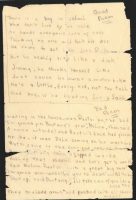
The earliest known writing of Bob Dylan is now in the hands of the Minnesota Historical Society. The two handwritten pages of poetry date back to around 1956, when he was a Hibbing High School student named Robert Zimmerman. His friend Dale Boutang saved the pages along with a photo of the two and a motorcycle. The Minnesota Historical Society recently acquired all three items at auction. The public can take a peek at the poetry and photo when they go on display at the Minnesota History Center’s Gale Family Library on Feb. 13.
The earliest known writing of Bob Dylan is now in the hands of the Minnesota Historical Society.
Poetry In the News
Poetry World Split Over Polemic Attacking 'Amateur' Work by 'Young Female Poets'
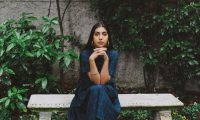
Giving a fresh meaning to the notion of a poetry slam, the august poetry journal PN Review has published a stinging critique of the “rise of a cohort of young female poets” led by the likes of Kate Tempest, Hollie McNish and Rupi Kaur, describing their work as characterised by “the open denigration of intellectual engagement and rejection of craft”. Poet Rebecca Watts took to the pages of PN Review to lay out her disdain for “the cult of the noble amateur”, and her despair at the effect of social media on poetry. Highlighting the work of poets such as Kaur (whose debut collection Milk and Honey has sold more than 1m copies worldwide), Tempest and, in particular, McNish, Watts attacks the “cohort of young female poets who are currently being lauded by the poetic establishment for their ‘honesty’ and ‘accessibility’”.
Why Is Instagram Censoring a 1992 Poem Revered by the LGBTQ Community?
“I want a dyke for president,” artist Zoe Leonard writes in her 1992 poem. Inspired by the author Eileen Myles’ run for president, and written at the height of the AIDS epidemic, the poem, “I want a president,” has since been shown in museums, galleries, and outdoor installations around the world. More than a quarter-century after it was written, the poem made its way to Instagram—and became the center of a controversy over censorship on social media. The storm surrounding the poem is a window into the tension between free expression and content moderation on Instagram. The platform has given audiences direct access to art, and is a forum for activism. But pieces like Leonard’s can also be censored under the vague rules that govern social media, imposed by a private company and executed with the help of machine learning and a legion of content moderators.
Georgette LeBlanc Named Canada's New Parliamentary Poet Laureate

Georgette LeBlanc, from Saint-Jean-sur-Richelieu, Que., has been named Canada's new parliamentary poet laureate. LeBlanc, who grew up in Baie Sainte-Marie, N.S., becomes the eighth poet to hold the position, after George Elliott Clarke's two-year term ended Dec. 31, 2017. "What a delight it is to accept this appointment as parliamentary poet laureate! It is a true honour," LeBlanc said in a statement.
Georgette LeBlanc, from Saint-Jean-sur-Richelieu, Que., has been named Canada’s new parliamentary poet laureate.
New Books
Drafts, Fragments, and Poems: The Complete Poetry by Joan Murray
[Paperback] NYRB Poets, 296 pp., $16.00
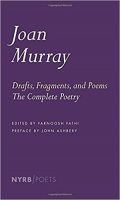
The first appearance of this award-winning writer's work since the 1940s, this collection, which includes an introduction by John Ashbery, restores Joan Murray's striking poetry to its originally intended form. Though John Ashbery hailed Joan Murray as a key influence on his work, Murray’s sole collection, Poems, published after her death at the early age of twenty-four and selected by W. H. Auden for inclusion in the Yale Series of Younger Poets, has been almost entirely unavailable for the better part of half a century. Poems was put together by Grant Code, a close friend of Murray’s mother, and when Murray’s papers, long thought to be lost, reappeared in 2013, it became clear that Code had exercised a heavy editorial hand. This new collection, edited by Farnoosh Fathi from Murray’s original manuscripts, restores Murray’s raw lyricism and visionary lines, while also including a good deal of previously unpublished work, as well as a selection of her exuberant letters.
Black Sea by David Yezzi
[Paperback] Carnegie Mellon University Press, 72 pp., $15.95
David Yezzi's fourth book of poems considers what it's like, during times of roiling change, to feel like a stranger on one's own street and in one's own country. This uprooting is partly geographic, partly psychic: what was familiar has become as foreign as the fabled Black Sea (the site of the Roman poet Ovid's exile). The emotional pressure of this dislocation pushes his poems into lyric fragments and mordant humor. Home, once a comfort, now hides a threat.
Extra Hidden Life, Among the Days by Brenda Hillman
[Hardcover] Wesleyan University Press, 152 pp., $24.95
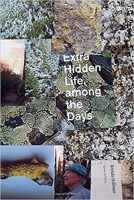
Brenda Hillman begins her new book in a place of mourning and listening that is deeply transformative. By turns plain and transcendent, these poems meditate on trees, bacteria, wasps, buildings, roots, and stars, ending with twinned elegies and poems of praise that open into spaces that are both magical and archetypal for human imagination: forests and seashores. As always, Hillman's vision is entirely original, her forms inventive and playful. At times the language turns feral as the poet feels her way toward other consciousnesses, into planetary time. This is poetry as a discipline of love and service to the world, whose lines shepherd us through grief and into an ethics of active resistance.
Requiem and Poem without a Hero by Anna Akhmatova
[Paperback] Swallow Press, 78 pp., $12.95
Anna Akhmatova (1889–1666) is one of Russia’s greatest poets, and perhaps the greatest woman poet in the history of Western culture. The two long poems included in this volume are the major works of Akhmatova’s majestic maturity. Both express her response to life under the Stalinist Terror: Requiem, a single, heart-rending cry; Poem Without a Hero, a symphonic, highly allusive work linking Stalinist Leningrad with Tsarist Petersburg, whose composition occupied the poet, obsessively, over the last twenty-five years of her life. The achievement of these two masterpieces, under conditions of officially imposed silence and terrible suffering, verifies a prophecy made even before the Revolution by her friend the poet Mandelstam, that she would become “a symbol of Russia’s grandeur.”
The Book of the Dead by Muriel Rukeyser
[Paperback] West Virginia University Press, 144 pp., $17.99
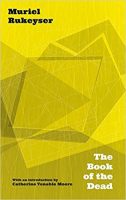
Written in response to the Hawk’s Nest Tunnel disaster of 1931 in Gauley Bridge, West Virginia, The Book of the Dead is an important part of West Virginia’s cultural heritage and a powerful account of one of the worst industrial catastrophes in American history. The poems collected here investigate the roots of a tragedy that killed hundreds of workers, most of them African American. They are a rare engagement with the overlap between race and environment in Appalachia. Published for the first time alongside photographs by Nancy Naumburg, who accompanied Rukeyser to Gauley Bridge in 1936, this edition of The Book of the Dead includes an introduction by Catherine Venable Moore, whose writing on the topic has been anthologized in Best American Essays.
Correspondences
Moving Toward Answers: A Conversation with Stephen Mills
by Julie Marie Wade

I like to imagine meeting Stephen Mills in Florida in 2012: he and his partner Dustin driving north to their new home in New York City, my partner Angie and me driving south to our new home in Miami. Somehow we meet in the middle, pass some poems between us like a torch. But the fact is, Mills and I are poets from other places who settled in the Sunshine State at different times. He was born and raised in Richmond, Indiana, and earned his MFA at Florida State University in Tallahassee. I was born and raised in Seattle, Washington, and moved to Miami after graduate school to teach in the MFA program at Florida International University.
Interview with Editors of Nasty Women Poets
Sarah Fawn talks to Grace Bauer and Julie Kane, editors of Nasty Women Poets: An Unapologetic Anthology of Subversive Verse (2017, Lost Horse Press).
Sarah Fawn: How did this project come about? How did the results of the election and transition impact the anthology?
‘Every poem is political’: Danez Smith, the YouTube Star Shaking Up Poetry
by Kate Kellaway

If you watch Danez Smith’s poem dear white america on YouTube – where it has racked up more than 300,000 viewings (not the sort of figures poetry usually attracts) – it is easy to see why Smith is becoming a phenomenon. The video is a powerful introduction to the collection Don’t Call Us Dead (a finalist in the US’s National Book award for poetry), which is about to be published in the UK. Smith has a colossal gift for performance. You are moved – shaken – as if you had been involved in an argument you couldn’t win. And, in a sense, if you are white, that describes the position.
If you watch Danez Smith’s poem dear white america on YouTube – it is easy to see why Smith is becoming a phenomenon.
Envoi: Editor’s Notes
Lessons from the Past: James Dickey
“Under the right circumstances you can pick up something that you've written and approve of it; you'll think it's good and that nobody could have done exactly the same thing. Under different circumstances, you'll look at exactly the same poem and say, “My Lord, isn't thatboring.” The most important thing is to be excited about what you are doing and to be working on something that you think will be the greatest thing that ever was. One of the difficulties in writing poetry is to maintain your sense of excitement and discovery about what you write. American literature is full of people who started off excited about poetry and their own contribution to it and their own relationship to poetry and have had, say, a modicum of success and have just gone on writing poetry as a kind of tic, a sort of reflex, when they've lost all their original excitement and enthusiasm for what they do. They do it because they have learned to do it, and that's what they do. You have to find private stratagems to keep up your original enthusiasm, no matter what it takes. As you get older, that's tougher and tougher to do. You want to try to avoid, if you possibly can, the feeling of doing it simply because you can do it.”
—from James Dickey, The Art of Poetry by Franklin Ashley, The Paris Review, Spring 1976
“You have to keep up your enthusiasm, no matter what it takes. That’s tough to do. Avoid doing something simply because you can.” – James Dickey